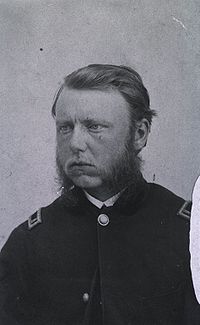Encyclopedia Dubuque
"Encyclopedia Dubuque is the online authority for all things Dubuque, written by the people who know the city best.”
Marshall Cohen—researcher and producer, CNN
Affiliated with the Local History Network of the State Historical Society of Iowa, and the Iowa Museum Association.
MATTHEWS, Washington
MATTHEWS, Washington. Washington Matthews (Killiney, Ireland, June 17, 1843 - March 2, 1905) The son of Nicolas Blayney Matthews and Anna Burke Matthews, Washington and his brother were brought to the United States after the death of his mother. He grew up in Wisconsin and Dubuque, Iowa and his father, Dr. N. B. Matthews, began training his son in medicine. He graduated from the University of Iowa School of Medicine in 1864. (1)
He volunteered for service in the Union Army during the CIVIL WAR. His first post was as surgeon at Rock Island Barracks, Illinois, where he tended to Confederate prisoners. (2)
Posted at Fort Union in what is now North Dakota/Montana in 1865, Matthews developed an interest in Native American peoples and languages. He would go on to serve at a series of forts in Dakota Territory until 1872: Fort Berthold, Fort Stevenson, Fort Rice, and Fort Buford. He was a part of General Alfred H. Terry's expedition in Dakota Territory in 1867. (3)
While stationed at the Fort Berthold in the Dakota Territory, he learned to fluently speak the Hidatsa language and wrote a series of works describing their culture and language including a grammar and vocabulary of the Hidatsa language and an ethnographic monograph of the Hidatsa. He also described, though less extensively, the related Mandan and Arikara peoples and languages. Some of his work on the Mandan was lost in a fire before being published. (4)
There is some evidence that Matthews married a Hidatsa woman during this time. Her name is not known. There is also speculation and circumstantial evidence that Matthews had a son. (5)
In 1877 Matthews participated in an expedition against the Nez Perce, and again in 1878 against the Bannock. While serving on a prison on Alcatraz Island in San Francisco Bay, Matthews made a study of the Modoc language. (6)
From 1884-1890, Matthews was posted to the Army Medical Museum in Washington, DC. During this time he conducted research and wrote several papers on physical anthropology, specifically craniometry and anthropometry. (7)
John Wesley Powell of the Smithsonian Institution's Bureau of American Ethnology suggested that Matthews be assigned to Fort Wingate, near what is now Gallup, New Mexico. It was there that Matthews came to know the people who would become the subject of his best known work, the Navajo. (8)
His work on the Navajo rejected previous thinking about the complexity of Navajo culture. Matthews referred to Dr Leatherman's account of the Navahoes as the one long accepted as authoritative. In it that writer declared that the Navajo have no traditions nor poetry, and that their songs "were but a succession of grunts." (9)
Dr. Matthews discovered that they had a multitude of legends, so numerous that he never hoped to collect them all: an elaborate religion, with symbolism and allegory; and many prayers and songs relating to all subjects. Matthews is said to have been initiated into various secret Navajo rituals. (10)
Matthews was quoted by Charles Darwin in his work on emotion; Matthews is cited with respect to the expression of emotion and other gestures among various peoples of America: the Dakota, Tetons, Grosventres, Mandans, and Assiniboine. Loeseliastrum matthewsii was named after him. (11)
---
Source:
1. "Washington Matthews," Wikipedia
2. Ibid.
3. Ibid.
4.


